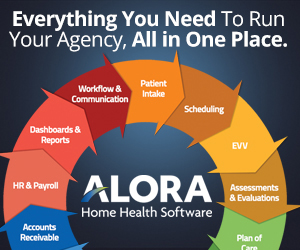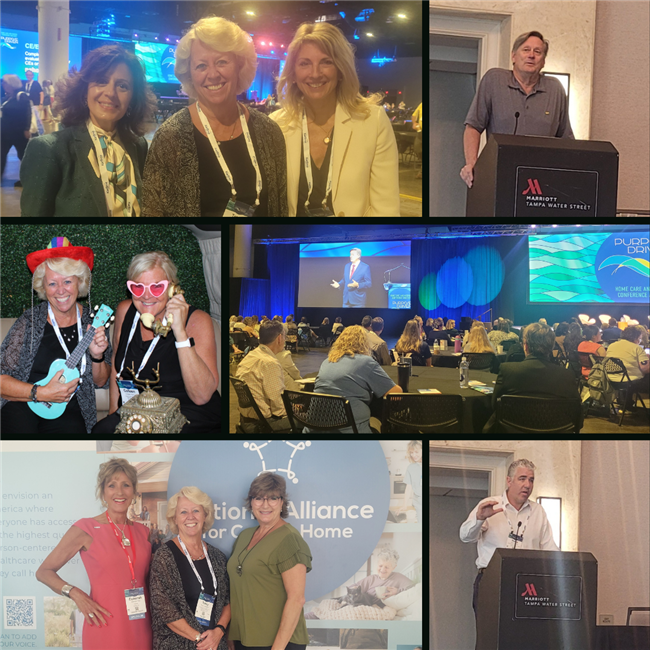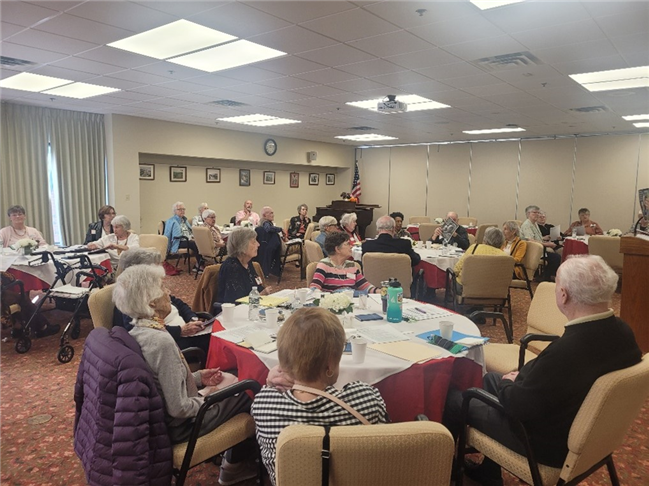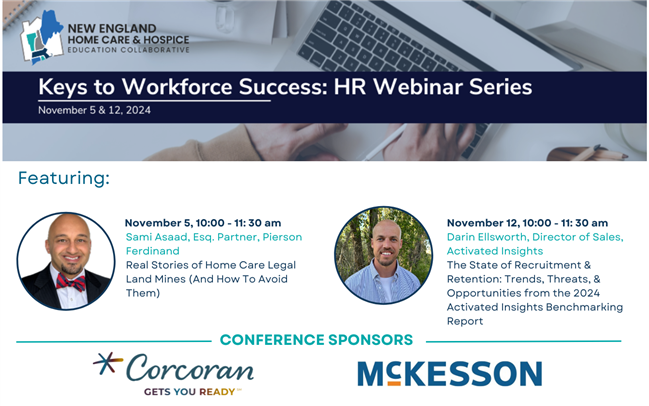 |
||||||||||||||||||||||||||
| October 24, 2024 | ||||||||||||||||||||||||||
Tampa has been hopping with National Association for Home Care and Hospice (NAHC) industry greats these last six days. Over 700 people from across the United States gathered for NAHC’s final Annual Conference, which started Sunday and ended Tuesday. Opening session included a review over the years by outgoing President/CEO Bill Dombi and a vision for the future from new President/CEO Dr. Steven Landers.
On Saturday, the state association executives gathered to brainstorm industry challenges and offer ideas for future support of the state associations as NAHC and NHPCO become one under the National Alliance for Care at Home (The Alliance).
On Tuesday, October 22nd, Tracy Wodatch had the opportunity to present before the Connecticut Continuing Care Residents Association (ConnCCRA) in Southbury on the topic, “Hospice Is a Service Not a Place – How Can It Work for You.”
Highlights of the presentation included the history and philosophy of hospice, shedding myths and answering many questions about timing and how to ask about hospice. Following the hospice discussion was another heavy but needed topic regarding Advanced Care Directives/Estate Planning. Lots of good but difficult conversation in a room filled with about 40 people from Continuing Care Residential Communities across CT.
Source: Dr. Steve Landers, CEO of the National Alliance for Care at Home, October 21, 2024
New research paints a worrisome picture of how Medicare home health cuts and barriers to care are endangering the lives of Medicare beneficiaries. Home health services are critical for some of Medicare’s sickest beneficiaries — those with serious illness who are homebound and struggle to access care outside their homes. For many, a lack of timely and quality home health care can be life-threatening.
Consider a patient just home from surgery, developing a severe complication like an infection or internal bleeding. For an isolated, low-mobility senior, an expert in-home nurse or therapist could be the last line of defense to identify the issue and intervene before it becomes fatal. Throughout my medical career, I have seen home health professionals avert disaster with skilled assessment and timely actions.
Source: The Alliance, October 15, 2024
Home health agencies are generating more referrals from their acute care partners, but acceptance of those referred patients is not keeping pace, according to the new “Evolution of Care” report from WellSky, that examined data from about 130,000 health care providers, including home health agencies, hospitals, and other sources.
Home health referrals are up about six percent in the last year, according to the report, which about doubles the growth in referrals to skilled nursing facilities. Last year, home health saw a 22 percent average increase in the total number of referral gains in 2023. “Demand for post-acute care shows no signs of slowing,” wrote the report’s authors. “The growth in referral volume likely reflects the increasing demand for post-acute care by older, more medically complex patients.”
Interestingly, referral volume is higher now than it was before the COVID-19 pandemic, suggesting the pandemic has had an enduring impact on the demand for post-acute care in the United States.
However, the share of referred patients accepted to post-acute care is declining, with less than 35 percent of refferals accepted by home health agencies of of October 2023. That’s a drop from before the pandemic, when almost half of all patients referred were accepted, according to the report.
“Acute providers are still struggling to secure post-acute care in a timely manner for their patients,” reads the report. “While [SNF] acceptance rates have improved since our last report, they remain lower than pre-pandemic levels. In contrast, home health acceptance rates remain consistently and significantly lower than pre-pandemic acceptance rates, despite home health receiving more referrals per patient.”
Source: The Alliance, October 16, 2024
Screen Positive for Health-Related Social Needs Indicator Confidential Feedback Report for home health with Educational Webinar and Fact Sheet
On October 15, 2024, the Centers for Medicare & Medicaid Services (CMS) released the new Screen Positive for Health-Related Social Needs (HRSN) Indicator Confidential Feedback Report to Home Health. This report presents summary information for your patient population on four HRSN data elements:
Results for this initial report are calculated using data from October 1, 2023 – September 30, 2024, and will be updated quarterly based on the most recent 12 months of available data. This report is provider-generated in the Internet Quality Improvement & Evaluation System (iQIES).
To support providers in accessing and understanding this new report, CMS has released an educational webinar recording and the related webinar slides and transcript. We also released a fact sheet that provides an overview of the Screen Positive for HRSN Indicator Confidential Feedback Report. For information on how to generate your report and to access the webinar recording video and related slides, transcript, and fact sheet, please go to the following Post-Acute Care Quality Reporting Program Training & Education pages: Home Health Quality Reporting Training & Education Webpage
CMS released its quarterly OASIS Q&As last week with just four questions being addressed. Among them was a question addressing accurate response for M1250 when an interpreter is being used.
Click October 2024 CMS Quarterly OASIS Q&As to access the full document.
Welcome the Association's newest member, Pennant!
Their home health and hospice agencies and senior living communities operate relatively independently and have no traditional corporate headquarters. Instead, they are supported by a “Service Center,” a world-class team of professional resources that advise on their respective areas of expertise. This allows on-site leaders and caregivers to focus squarely on day-to-day care and business issues in their individual agency or community.
|
||||||||||||||||||||||||||
| Past Issues | Subscribe | cthealthcareathome.org | Advertise with Us | ||||||||||||||||||||||||||







